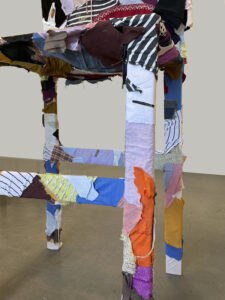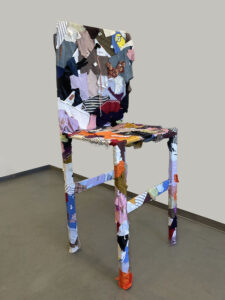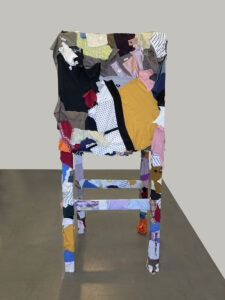Throne
Kasha (Katie) Frazee (2021)Throne is a mixed-media sculpture (found clothing, machine-sewn thread, glue, and wood) to investigate sustainability in the fashion industry. Clothing pollution accounts for 10 percent of all global pollution, above gas and oil. This massive industry has disastrous effects on the environment, especially due to the long life cycle of the manufacturing process. Each step involves extended transportation, often international, increasing energy expense and waste textile production. This industry uses energy, fuel, water, polluting chemicals and hazardous fibers, creating tons of non-biodegradable materials. Though hazardous sweatshops are stereotypically illustrated as foreign mainstays, the U.S. is no exception to these work-conditions. US sweatshops exploit vulnerable and undocumented immigrants who are paid by piece of clothing and regularly below minimum wage. Following the extended map of clothing waste also traces U.S. international trade in waste itself. The U.S. companies continue to ship waste overseas to developing countries who manage 70 percent of plastic waste. The United States is a primary contributor to global exploitation and waste in the fashion industry.



For Throne, Frazee cut up found clothing, separating zippers, buttons, drawstrings and clothing tags to downgrade and dethrone the items from their normally glorified state, as garments and fashion commodities. Frazee writes that “[their] hope is that this piece will inspire people to think about each step of the manufacturing process. I machine-sewed random lines of thread to demonstrate the individual process of sewing, apart from its functionality. The mass of the chair signifies the unwavering power and control of capitalism and its effects on humans and the environment. I utilized the sewing aspect of the sewing machine, as I now feel comfortable with machine sewing for the first time. I am still figuring out how to program the embroidery aspect of the machine.”
This project was made possible with support of microgrant#2021-042. Additional images are available here.



